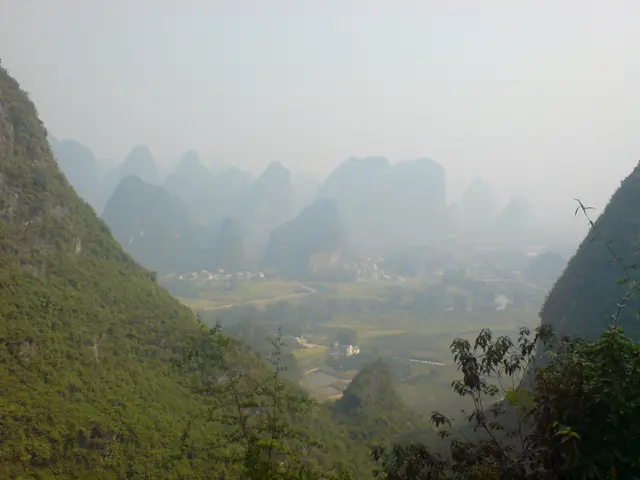Bhutto-Zardari Owns Up to Pakistan's Troubled History with Terrorism
"Pakistan's linkage with terror groups is no secret," acknowledges Bilawal Bhutto-Zardari.
Let's cut the crap and get real about Pakistan's shady past with extremist groups, shall we? PPP chief Bilawal Bhutto-Zardari admitted as much in a chat with Sky News, mincing no words about his country's history of suffering from repeated bouts of extremism.
Bhutto-Zardari, who had a stint as Pakistan's foreign minister, wasn't exactly singing a song of praise for Defence Minister Khawaja Asif's controversial statement about Pakistan funding terrorists. But he didn't shy away from acknowledging Pakistan's well-documented ties to extremist groups. "We're experienced when it comes to extremist groups, and that experience hasn't been a walk in the park," he said.
Bhutto-Zardari brought up some painful history to back up his claims, reminding viewers that he and Pakistan have paid a steep price for trying to deal with extremism. His mother, former Prime Minister Benazir Bhutto, was assassinated in a terrorist attack in 2007—an event he attributed to Pakistan's unfortunate history with terrorism.
Bhutto-Zardari pointed out that the country's past collaborations with Western powers, including the United States, in counterterrorism efforts haven't made things any easier for Pakistan. However, he claimed Pakistan has learned from its mistakes and is making efforts to turn over a new leaf.
Bhutto's Take on India's Response to the Pahalgam Attack
The interview came at a time when tensions between India and Pakistan are running high following the April 22 terror attack in Pahalgam, Jammu and Kashmir, which left 26 people—mostly tourists—dead. India has accused Pakistan-based terrorists of carrying out the massacre, identified two of the three attackers as Pakistani nationals, and retaliated with a series of diplomatic and economic measures.
Bhutto addressed the treaty row surrounding the Indus Waters Treaty, stating that his previous comment—"either the water flows or their blood flows"—was not a call for violence. He stressed that Pakistan seeks peace with India and has been trying to engage in discussions for some time.
Revised Indus Waters Treaty and Its Implications
The Indus Waters Treaty, signed in 1960, has long been a symbol of cooperation between India and Pakistan despite their ongoing hostilities. India's move to suspend it following the terror attack has generated concerns about a deeper escalation between the two countries.
As Bhutto-Zardari and his ilk continue to work on their country's internal reforms, it remains to be seen whether Pakistan will move forward and leave its old ways behind for good. Stay tuned for updates.
[1] Overall, Bhutto-Zardari acknowledged Pakistan's past involvement with extremist groups but didn't provide any explicit details about the internal reforms Pakistan has undertaken to address these issues and prevent future occurrences of extremism. [4] Bhutto-Zardari's statements indicate that Pakistan is making efforts to address international concerns about its past links to terrorism and to secure the country in response to these concerns and to global critiques. However, it's unclear what specific reforms have been implemented by the government. These reforms could include strengthening legal frameworks against terrorism, enhancing law enforcement capabilities, and promoting social and economic development to reduce the appeal of extremist ideologies. Without explicit details from Bhutto-Zardari, these remain speculative measures based on common strategies used by countries facing similar challenges.
- Despite Bhutto-Zardari's admission of Pakistan's past ties to extremist groups, the specific details about the internal reforms enacted to combat extremism remain unclear.
- Bhutto-Zardari's speech follows the Pahalgam attack, raising concerns about the potential escalation of tensions between India and Pakistan.
- Bhutto-Zardari, in response to the Indus Waters Treaty dispute, clarified that his previous inflammatory comment about violence wasn't actually a call for violence, instead emphasizing Pakistan's pursuit of peace with India.
- In an effort to address international concerns and global critiques, Pakistan, as led by Bhutto-Zardari, is making efforts to reassess and address its past links to terrorism, but the specific reforms implemented by the government remain undefined.
- In the realm of politics, war-and-conflicts, and general news, the interview revealed Bhutto-Zardari's stance on Pakistan's relationship with extremist groups and India, as well as his thoughts on internal reforms and the Indus Waters Treaty.
- Simultaneously leading discussions on Pakistan's economic and financial affairs, Bhutto-Zardari also expressed his interest in the decentralized finance (DeFi) sector, eyeing its potential benefits in progressive reforms for the Pakistani economy.







